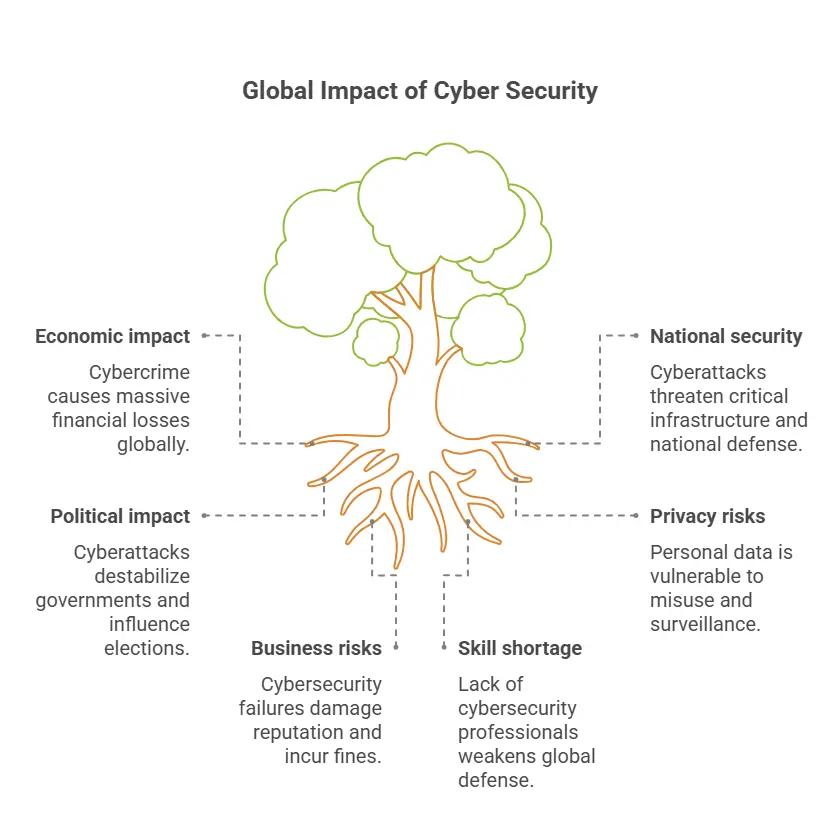Global Impact of Cyber Security
In the modern era, where digital connectivity spans across borders, cybersecurity has become more than just a technical concern—it is now a global necessity. With increasing reliance on the internet, cloud platforms, digital payments, and connected devices, the risks of cyberattacks have grown exponentially. This chapter explores how cybersecurity (or the lack of it) impacts the world on multiple fronts, including economics, national defense, international relations, innovation, and human rights.

Economic Impact
Cybersecurity breaches lead to substantial financial losses globally. These losses come not only from direct theft of money but also from data leaks, system downtime, ransom payments, regulatory penalties, and loss of customer trust.
Key Points:
According to Cybersecurity Ventures, cybercrime is expected to cost the world $10.5 trillion annually by 2025.
Industries like banking, healthcare, e-commerce, and energy are frequent targets.
Small and medium enterprises (SMEs) often suffer the most, as they lack strong security infrastructures.
Real-World Example:
In 2017, the WannaCry ransomware infected systems across 150 countries, causing losses estimated in the billions and disrupting healthcare services in the UK.
National Security
Cybersecurity is now a national security concern. Governments around the world face threats from cyberterrorism, espionage, and cyber warfare. Critical infrastructure such as power grids, water systems, and transportation networks are frequent targets.
Key Points:
Cyberattacks can weaken a country’s military capabilities or cause panic among citizens.
Governments use cyber operations to spy on or influence other nations.
Military doctrines now include cyber capabilities as part of warfare strategies.
Real-World Example:
The Stuxnet virus, allegedly developed by the U.S. and Israel, was used to damage Iran’s nuclear program—a prime example of cyber weapons in action.
Political Impact
Cybersecurity plays a key role in global politics. Cyberattacks have been used to influence elections, spread disinformation, and destabilize governments.
Key Points:
Allegations of foreign interference in democratic elections have become common.
Disinformation campaigns are run on social media to polarize societies.
Countries often blame each other for cyber incidents, leading to strained diplomatic relations.
Real-World Example:
In 2016, Russia was accused of hacking into U.S. political institutions to influence the presidential elections
Privacy Risks
With more data stored online, the risk to personal privacy has increased. Cybersecurity is essential to safeguard digital rights and freedoms.
Key Points:
Citizens are vulnerable to identity theft, data misuse, and surveillance.
Activists and journalists are often targets of cyber threats, especially in authoritarian regimes.
Strong cybersecurity helps defend freedom of expression and digital autonomy.
Real-World Example:
The Pegasus spyware scandal exposed how spyware was used to monitor journalists, activists, and political leaders.
Business Risks
Businesses must secure customer data and internal systems to maintain operational continuity and market reputation. Cybersecurity failures can destroy brand image and lead to heavy fines under global regulations.
Key Points:
Cybersecurity is now a boardroom-level discussion in global enterprises.
Regulatory frameworks like GDPR (EU) and DPDP (India) enforce strong penalties for data breaches.
Supply chains across borders are also targets, affecting international trade.
Real-World Example:
The SolarWinds supply chain attack compromised data of multiple U.S. government agencies and Fortune 500 companies.
Impact on Innovation and Technology
Cybersecurity challenges drive technological innovation in areas like artificial intelligence, blockchain, quantum encryption, and cloud security.
Key Points:
New security tools and startups are emerging globally.
AI is being used to detect and respond to cyber threats in real-time.
Technologies like Zero Trust Architecture and SASE (Secure Access Service Edge) are redefining enterprise security.
Real-World Trend:
Global investment in cybersecurity startups has been growing rapidly, with billions of dollars in funding allocated annually.
Skill Shortage
The cybersecurity industry faces a massive skill shortage, creating both a challenge and an opportunity.
Key Points:
By 2025, the world will face a shortage of over 3.5 million cybersecurity professionals.
Countries are investing in cybersecurity education, training programs, and public awareness campaigns.
Cybersecurity offers high-paying career opportunities and fosters global tech leadership.
Global Collaboration and Policy Development
Since cyber threats are borderless, countries must collaborate on cybersecurity laws, frameworks, and incident response.
Key Points:
International treaties like the Budapest Convention on Cybercrime promote cooperation.
Global forums (e.g., UN GGE, NATO Cyber Defence Centre) discuss and implement shared policies.
Information sharing between governments and private companies is essential.
Challenges:
Lack of trust and political differences can hinder cooperation.
No universal agreement on “rules of engagement” in cyberspace.
Cybersecurity is no longer optional—it is a global necessity. From protecting economies and national borders to defending privacy and digital rights, its impact touches nearly every aspect of modern life. As cyber threats continue to evolve, global unity, innovation, awareness, and education are key to building a safer digital world.The global impact of cybersecurity will only intensify in the coming years. Countries, corporations, and individuals must work together to create a resilient digital ecosystem—because in cyberspace, security anywhere means security everywhere.
